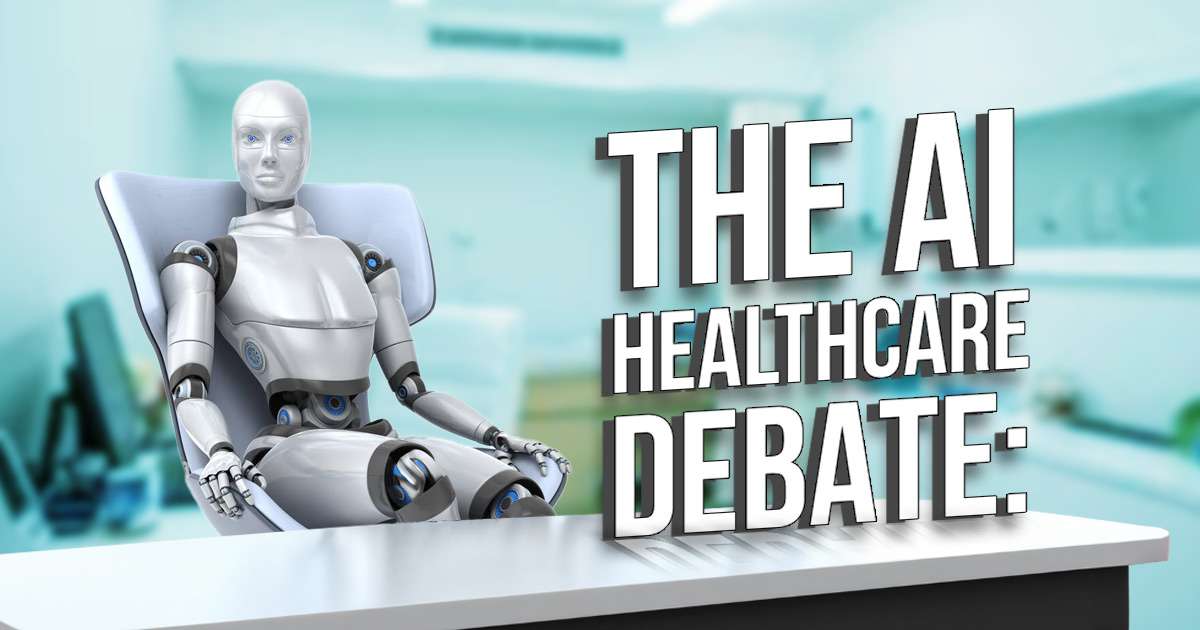The AI Healthcare Debate: Benefits vs. Risks

Artificial intelligence (AI) is transforming healthcare, offering innovations that could improve patient outcomes and streamline processes. However, despite the immense benefits of AI, we must address some risks and challenges. Explore the pros and cons of AI in healthcare, examining both the advantages and drawbacks of using this technology.
The Rise of AI in Healthcare
AI includes various technologies that allow machines to do tasks that usually need human intelligence. In healthcare, AI is used for things like analyzing data, helping with diagnoses, monitoring patients, and automating administrative tasks. As healthcare continues to change, it’s important for everyone involved to understand both the advantages and disadvantages of artificial intelligence in healthcare
The Pros of AI in Healthcare
AI has many benefits in healthcare, some of which include:
1. Improved Diagnosis and Accuracy
One of the biggest advantages of artificial intelligence in healthcare is its ability to improve diagnostic accuracy. AI systems can scan massive volumes of data, recognize patterns, and spot diseases like cancer early on. These systems are often faster and more precise than human professionals, which can help in reducing errors and ensuring better patient outcomes.
2. Better Patient Monitoring
AI technologies, like wearable devices, help monitor patients’ health in real-time. These devices monitor vital signs like heart rate and oxygen levels and communicate results to doctors quickly. This not only improves patient care but also enables early diagnosis of problems, resulting in prompt actions.
For instance, AI tools for diabetes management continuously monitor blood sugar levels and provide instant feedback, helping doctors adjust treatments accordingly.
3. Cost Reduction
Another advantage of AI in healthcare is cost efficiency. AI can automate routine duties like as scheduling, billing, and even some diagnostic processes, allowing healthcare workers to concentrate on patient care. This automation also helps to cut down on unnecessary medical tests, which reduces overall healthcare costs.
In surgeries, AI-powered robots can perform precise operations, reducing recovery times and the need for extended hospital stays.
4. Faster Drug Development
AI is accelerating the process of discovering new medications. It can analyze data on existing medications and predict which new compounds might be effective for treating specific conditions. This process, which used to take years, can now be completed in a fraction of the time, bringing new treatments to patients faster.
5. Personalized Treatments
AI can assist in developing individualized treatment recommendations based on a patient’s unique medical history, genetics, and lifestyle. By analyzing all this data, AI can recommend treatments that are specifically tailored to each patient, improving the chances of success.
6. Improving Administrative Efficiency
Healthcare organizations often face complicated administrative tasks that take time away from patient care. AI can assist by automating these chores, allowing employees to concentrate on more vital responsibilities. For example, AI-powered systems can process insurance claims more quickly and efficiently, saving time on paperwork.
The Cons of AI in Healthcare
While AI has many pros, there are also several drawbacks of AI in healthcare that must be considered.
1. Lack of Human Interaction
A major disadvantage of using AI in healthcare is that it lacks the human touch. While AI can process and analyze data, it cannot offer the empathy and understanding that patients often need. In areas like mental health or palliative care, the emotional connection between a patient and a healthcare provider is critical, and this is something AI cannot replace.
2. High Implementation Costs
Although AI can save money in the long term, the upfront expenditures of adopting AI systems are significant. Hospitals and clinics must invest in technology, train employees to use it, and maintain these systems. For smaller healthcare providers, this can be a significant challenge, making it harder for them to access the benefits of AI.
3. Privacy Concerns
AI systems require huge amounts of patient data to work properly, raising privacy concerns. If a data breach occurs, sensitive medical information could be exposed. When applying artificial intelligence in healthcare, it is critical to ensure the privacy and security of patient data.
There are also strict regulations, like the Health Insurance Portability and Accountability Act (HIPAA), that healthcare providers must follow to protect patient information, making the use of AI more complex.
4. Bias in AI Algorithms
AI systems are only as good as the data they’re educated with. If the data utilized to construct these systems is biased, the results can be skewed. For instance, if an AI diagnostic tool is trained on data that mostly includes one demographic, it may not work as well for people from other groups. This can worsen healthcare disparities rather than solve them.
5. Job Loss Concerns
One of the negatives of AI in healthcare is job displacement. AI has the potential to replace certain roles within healthcare, particularly in areas like administrative work or diagnostic services. This can raise concerns about job loss among healthcare staff. While AI is meant to assist professionals, there’s a fear that it could eventually take over some positions altogether.
6. System Failures
AI systems are not perfect and can sometimes fail. Whether due to technical glitches or incorrect data, these systems can make mistakes. If healthcare providers rely too much on AI, there’s a risk that a wrong diagnosis or treatment could occur, potentially putting patients’ lives at risk. This is why human oversight is still crucial when using AI in healthcare.
Balancing the Pros and Cons of AI in Healthcare
The pros and cons of AI in healthcare reveal a complex landscape where the advantages must be carefully weighed against the risks. AI has the ability to significantly improve patient care and increase healthcare operations efficiency. However, it’s equally important to address issues like ethics, data privacy, and the challenges of implementing new technology.
Strategies for Effective Integration
To make the most of AI while minimizing its drawbacks, the following strategies are essential:
- Establish Clear Guidelines: Creating clear regulations for the use of AI in healthcare can help address ethical concerns and hold everyone accountable.
- Invest in Training: Providing healthcare professionals with the right training will help them adapt to AI-enhanced systems more easily.
- Focus on Data Security: Strong cybersecurity measures are key to protecting sensitive patient information from breaches and misuse.
- Encourage Collaboration: Promoting teamwork between tech experts and healthcare providers will ensure that AI tools are built to meet actual clinical needs.
The Future of AI in Healthcare: Balancing Benefits and Challenges
AI is changing healthcare by offering benefits like better diagnoses, lower costs, and quicker drug development. However, there are certain drawbacks, such as privacy concerns, bias, and reduced human interaction. To make the most of AI while minimizing the downsides, we need clear rules, good training, strong data protection, and teamwork between healthcare providers and tech experts. With these steps, AI can improve healthcare without losing the personal touch patients need.

